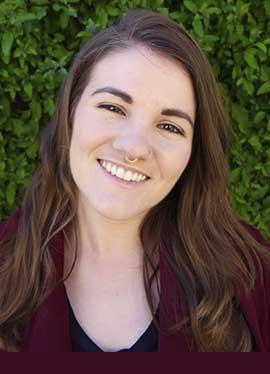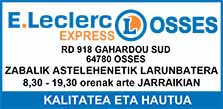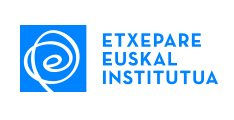Euskaraldia is going on in the Basque Country from November 23rd to December 3rd. That's 11 days of increased use of Euskara!
If you haven't heard of Euskaraldia, it's an initiative that has thousands of people from all 7 provinces in the Basque Country speaking more Euskara. Euskara speakers commit to starting every conversation in Euskara during this time, and people who can understand Euskara ask others to speak the language to them.
As a member of the Basque diaspora, I think this is a wonderful project.
I admire the determination in some parts of the Basque Country to keep Euskara alive. I applaud the commitment of Basque organizations and the Basque Government to promoting the language and ensure it's transmitted to the next generations.
It's noble how hard Basques in the Basque Country are working to revitalize Euskara and make it a thriving minority language in Europe. It would be a dream for it to become the majority language of the Basque Country, but I think many years and many generations will have to come before that happens.
If the goal of Euskaraldia is to increase Euskara use and make it more common throughout the Basque Country, I see great potential in it. When the language is in more common use, people will have a greater incentive to learn it.
I spent a couple of weeks in Donostia last year, and three times during my stay people in the street spoke Euskara to me. It was a beautiful and jarring reminder that I was indeed in the Basque Country. Even though I didn't understand what was said to me, I felt proud to be a part of this culture.
But initially, in the moment, I was completely mortified that I couldn't respond back in Euskara.
And I think that's part of the point of Euskaraldia. While not an explicitly stated goal, frustrating non-speakers with the use of Euskara over time could inspire people to learn the language. There's no doubt that an inability to communicate creates a motivation to learn a dominant language.
So perhaps with Euskara being more commonly used around the Basque Country, if only for 11 days, people living in the Basque Country will think more about learning the language.
And hopefully after 11 days, participants feel compelled to continue the challenge, to increase the amount of Euskara they use in day-to-day life regularly.
As a member of the Basque diaspora who doesn't speak Euskara, learning about Euskaraldia has made me pause and consider the use of Euskara in the Basque diaspora. I cannot speak for all of the diaspora or even for Basque Americans, but only from what I have seen in my own communities.
There is a generational divide in who speaks Euskara and who doesn't among many families of Basque immigrants. I find that older generations are more likely to speak Euskara than the younger generations. Oftentimes in these cases, Basques born in the United States who speak Euskara have both of their parents coming from the Basque Country. As Basques marry people who do not speak the language, the likelihood of Euskara being transmitted diminishes.
A 2016 study found that if only one parent speaks Euskara, more than 60% of children learn another language exclusively. This study was done in the Basque Country, but I wouldn't be surprised if things are similar in the Basque diaspora.
I don't know many people my age in the Basque community, who are mostly grandchildren and great-grandchildren of Basque immigrants, who speak Euskara fluently.
Some make efforts on their own to learn online, some children have Euskara classes for two weeks in the summer at Udaleku, and others are able to access weekly classes run by their local Euskal Etxea. For college students at Boise State University and the University of Nevada Reno, Euskara classes are available on a longer term basis.
In my case, my mom was born in the United States and grew up speaking English. My father came from the Basque Country.
But as is the case with many Basque immigrants in the United States, my aita spent most of his time outside the home working. He would leave the house every day before 6:30AM and get home in time for dinner at 6PM. And considering my bedtime as a child was around 8PM, is it any wonder I never learned Euskara?
Because the parent I spent the most time with doesn't speak Euskara, I did not acquire the Basque language. I learned the language of my mother quickly and easily, but I still struggle with the language of my father. There's a reason a person's native language is sometimes called a "mother tongue."
People then often ask why I haven't learned Euskara as an adult. And I feel like my answer to that question is very much a driving force behind Euskara initiatives like Euskaraldia: It's easier for me not to learn Euskara.
I have many reasons and excuses and explanations, but they all come down to one practical thing: my life is already conducted entirely in English. My work and social life happen in English. Living in an English-speaking country, everywhere I go, I can accomplish everything I need in English.
Of course there are reasons to learn a language other than practicality, but practicality is a huge motivator!
I imagine for many people in the Basque Country, life for them is comfortable to live using Spanish or French all day, every day. But if Euskaraldia and other Euskara-promoting programs can change that reality, the motivation for residents of the Basque Country to learn and speak Euskara regularly would surely increase. Become more urgent, even.
Because when confronted with a language you don't speak, you have to figure something out quickly to communicate. Hand gestures and smiling works fine when you're traveling through an area temporarily, but imagine having to do that every day to navigate your place of residence. You would have a greater incentive to work on learning the native language of the region.
This is where I see the greatest strength in Euskaraldia: beginning to create a social and cultural environment in which Euskara is the default language. I wholeheartedly applaud this paradigm shift. Despite not speaking Euskara myself (at the moment, you never know in the future), I am symbolically and sentimentally attached to its perpetuation.
After all, Euskara is the language of my father and his brothers and sister. The language of his parents, the amatxi and aitatxi I never had the chance to meet. The language of my great-grandfather, Martin Larramendy, who was a regionally famous bertsolari in his own time.
If Euskara were to die, a piece of my history and family would die with it.
And for that I am grateful to see such activism in the Basque Country around promoting it. The stubbornness and ability to persevere that the Basques are well known for fuels this determination to see Euskara live on. May it live on!



 Enviar a un amigo
Enviar a un amigo Añadir comentario
Añadir comentario









